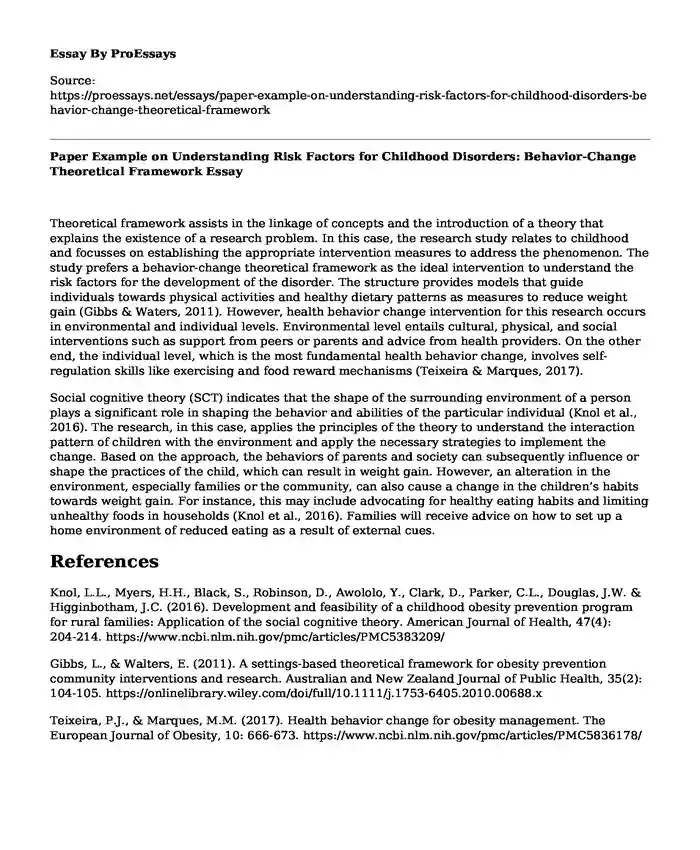Theoretical framework assists in the linkage of concepts and the introduction of a theory that explains the existence of a research problem. In this case, the research study relates to childhood and focusses on establishing the appropriate intervention measures to address the phenomenon. The study prefers a behavior-change theoretical framework as the ideal intervention to understand the risk factors for the development of the disorder. The structure provides models that guide individuals towards physical activities and healthy dietary patterns as measures to reduce weight gain (Gibbs & Waters, 2011). However, health behavior change intervention for this research occurs in environmental and individual levels. Environmental level entails cultural, physical, and social interventions such as support from peers or parents and advice from health providers. On the other end, the individual level, which is the most fundamental health behavior change, involves self-regulation skills like exercising and food reward mechanisms (Teixeira & Marques, 2017).
Social cognitive theory (SCT) indicates that the shape of the surrounding environment of a person plays a significant role in shaping the behavior and abilities of the particular individual (Knol et al., 2016). The research, in this case, applies the principles of the theory to understand the interaction pattern of children with the environment and apply the necessary strategies to implement the change. Based on the approach, the behaviors of parents and society can subsequently influence or shape the practices of the child, which can result in weight gain. However, an alteration in the environment, especially families or the community, can also cause a change in the children’s habits towards weight gain. For instance, this may include advocating for healthy eating habits and limiting unhealthy foods in households (Knol et al., 2016). Families will receive advice on how to set up a home environment of reduced eating as a result of external cues.
References
Knol, L.L., Myers, H.H., Black, S., Robinson, D., Awololo, Y., Clark, D., Parker, C.L., Douglas, J.W. & Higginbotham, J.C. (2016). Development and feasibility of a childhood obesity prevention program for rural families: Application of the social cognitive theory. American Journal of Health, 47(4): 204-214. https://www.ncbi.nlm.nih.gov/pmc/articles/PMC5383209/
Gibbs, L., & Walters, E. (2011). A settings-based theoretical framework for obesity prevention community interventions and research. Australian and New Zealand Journal of Public Health, 35(2): 104-105. https://onlinelibrary.wiley.com/doi/full/10.1111/j.1753-6405.2010.00688.x
Teixeira, P.J., & Marques, M.M. (2017). Health behavior change for obesity management. The European Journal of Obesity, 10: 666-673. https://www.ncbi.nlm.nih.gov/pmc/articles/PMC5836178/
Cite this page
Paper Example on Understanding Risk Factors for Childhood Disorders: Behavior-Change Theoretical Framework. (2023, Sep 22). Retrieved from https://proessays.net/essays/paper-example-on-understanding-risk-factors-for-childhood-disorders-behavior-change-theoretical-framework
If you are the original author of this essay and no longer wish to have it published on the ProEssays website, please click below to request its removal:
- Aging Parents Essay Example
- Childhood Trauma and Criminal Behavior: An Annotated Bibliography
- Cause and Effect of How an Inferiority Complex Makes Some Women Repeatedly Get into Destructive Relationships
- Self-Reflection: Motivation Paper Example
- Exploring Policing and Race: A Review of Security and Its Impact
- Research Paper on Childhood Abuse: Cause of Identity Dissociative Disorder
- Parenting Capacity Assessment: Evaluating Parents' Responsibilities for Child Upbringing - Essay Sample







